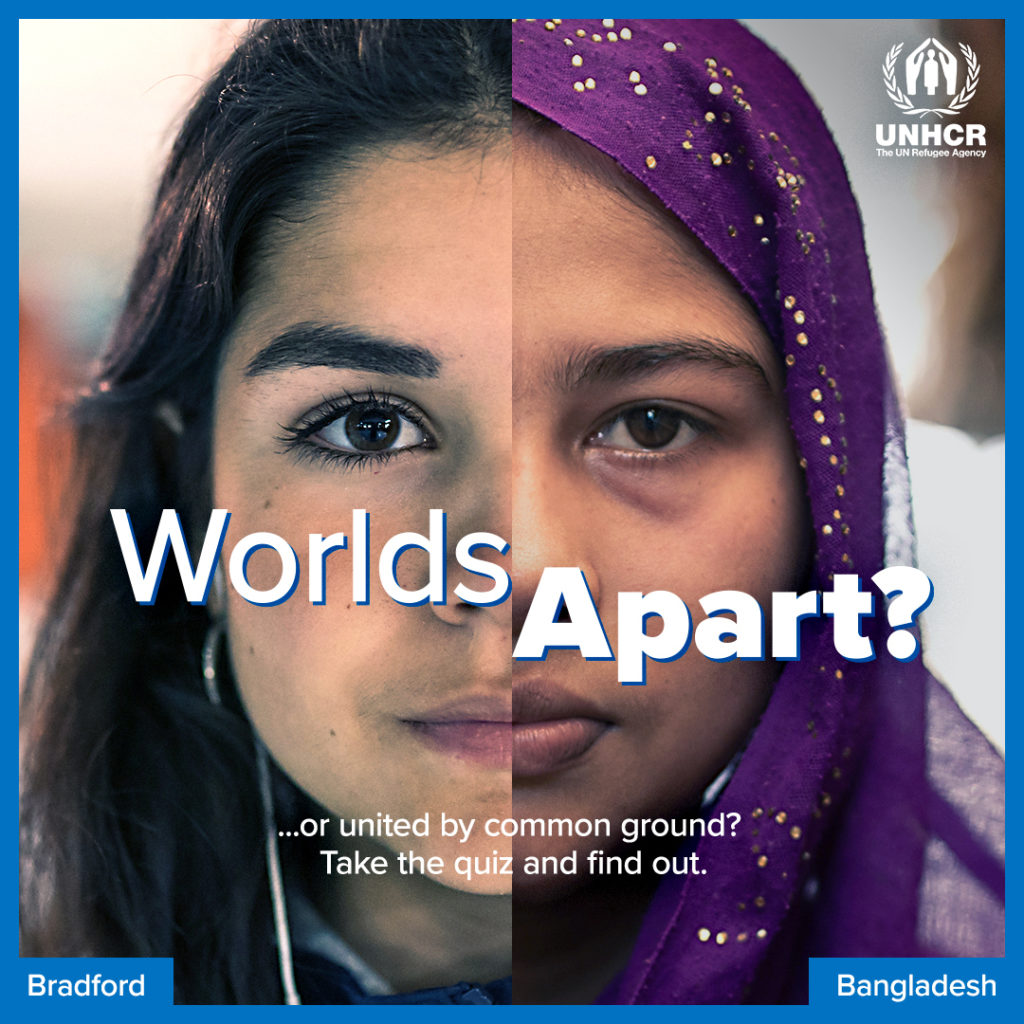We first started working with UK for UNHCR three years ago. At the time they took a less native approach to their fundraising, often adapting offline creative for online audiences and running campaigns with more ‘traditional’ fundraising tactics at big moments in the calendar year such as winter.
Working together, we set three goals to help transform their digital fundraising:
- Develop a digital first approach to online acquisition
- Test insight driven concepts and differentiated creative
- Increase UNHCR’s visibility and overall brand awareness
As a result, we’re so proud of the campaigns that we’ve created in collaboration over the last couple of years because ultimately, they have been rooted in and informed by the desire to focus on: Dignity, Empathy and Relatability.
Bringing this to life: Winter 2020
Winter is a key moment for UNHCR. But it’s also a time of year where there is a lot of fundraising, and lots of competition. Charities are competing not only for donations, but for visibility, and memorability. And we knew that in order to stand out, we would have to take a different approach to Winter – one that felt less seasonal and less conventional.
When we evaluated all that had happened in 2020, we knew that the circumstances of the pandemic were something we couldn’t ignore. Although we all experienced that first year of COVID differently, there were certain universals – those feelings of distance, separation, disruption and fear – that felt important to acknowledge and reference in our work.
When refugees flee home, their lives are turned upside down overnight. Every semblance of normality, of routine, of predictability – is removed suddenly and often with very little warning. Keeping this insight in mind, we we came up with the concept of ‘Worlds Apart’ – a campaign that communicated that whilst we can never truly imagine what it feels like to be a refugee, some of what we have experienced in 2020, can help us better understand and contextualize the acuity of this hardship.

This concept was about highlighting the fact that, despite the apparent distance that separates us, refugees are not “just like us”, they are “us” – they feel the same things we do, they worry about the future, they long to see their loved ones, and ultimately — they want life to feel normal, safe and stable again.
In order to gather the material for this, we ran a survey asking members of the British public to describe their lockdown experience. We then used existing video material to source quotes from refugees. The quiz showed the quote in isolation and asked users to guess who said what.
Using online paid media, we engaged the audience with campaign branding and messaging before the direct ask in a bid to increase their propensity to donate – by encouraging our core audiences to take the quiz, we were choosing to educate, before conversion. Digital display also played an invaluable role within the channel mix with the average gift almost £30 higher than on social media.
In total, the campaign delivered a 3:1 return on ad spend with over £600k raised from 6,500 donations.
Sustaining impact: Winter 2021
The 2020 Winter Appeal was rooted in the societal context in which we were all living. By 2021, COVID was still present but the landscape had changed.
The conversation around refugees in the UK had continued to grow increasingly hostile, across the media and policy landscape. And we wanted to speak to audiences to uncover new insights and understand how they felt about these issues.
We ran two focus groups. One where the respondents matched the UK for UNHCR average donor profile, and one which represented younger audiences. In our focus groups, the majority of respondents told us that despite caring about refugees in theory, they didn’t feel particularly close to the issue. Many attributed this to the fact that the refugee crisis felt loaded and hyper-political.
As a result of these insights and time spent with audiences, we wanted our campaign to:
- Bring audiences closer to refugees not just the refugee crisis itself
- Get audiences to think beyond usual stereotypes and negative press
- Tell the stories of real individuals in order to reframe people’s understanding
- Show that help was needed to create the change we were seeking
Using a search bar motif, we posited a question to the audience. Who is a refugee?
Our creative incorporated a mix of footage and typography, offering intimate snapshots, telling stories of the people we are trying to help: e.g. a father who is a doting parent and wonderful cook, who spends his days worrying about how his children are going to survive the winter.
Once again for the first two weeks, we ran activity with no direct conversion asks as we focused on brand awareness to introduce our existing and prospective audiences to the core message and deepen their engagement with the brand. Our core objective was to ensure that when someone saw an advert on any channel, they would remember that message a day later. Even without a direct ask, this resulted in donations.
In total, the campaign delivered over 7,500 donations raising over £735k for the cause with the average donation value 37% higher YOY.
So, as organizations look to start planning their seasonal fundraising activities, we have a few takeaways to potentially keep in mind:
Empathy is all about fostering connection – and at the heart of this is audience research. Investing in research is central to understanding donor interests, motivations and attitudes.
Seasonal campaigns are often indistinguishable from one another. Focusing on differentiated, insight-driven creative will help your organisation to stand out in these moments, and cut through visual fatigue.
Authentic, educational marketing drives brand visibility and increases the overall value of the donor, even if it lengthens the conversion journey.
Want to share your thoughts on this piece or chat about how your organization is adapting content for online audiences? Reach out.